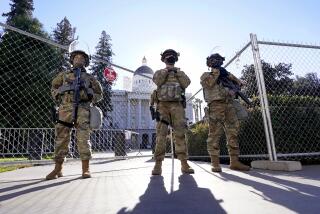Galvin Probe Targets 10 Defense Firms
- Share via
SAN DIEGO — The federal investigation of Washington defense consultant William M. Galvin, a central figure in the Pentagon procurement scandal, has focused on his work for 10 defense contractors--including Beverly Hills-based Litton Industries, according to newly obtained court records.
Investigators suspect that Galvin--a self-described super salesman with ties to many of the Pentagon officials and defense firms named in the still-unfolding procurement probe--improperly obtained Air Force procurement data related to the competition between two of his defense clients for the contract to supply an airborne radar warning system, the documents say.
Seek Bribery Evidence
The records, primarily the FBI’s warrant to search Galvin’s office at the Watergate complex in Washington, state that agents were seeking evidence of whether Galvin bribed or paid gratuities to Pentagon officials--the most direct assertion yet of the alleged offenses of which the 57-year-old ex-Marine is suspected.
Though prosecutors have kept details of the nationwide investigation under tight wraps, it was Galvin’s own lawyers who made the warrant public this week. They filed the document in arguing for a delay in a civil lawsuit in San Diego that accuses Galvin and others of damaging the fortunes of Cubic Corp., one of the defense firms for which Galvin gathered closely-held procurement information.
Galvin’s attorneys could not be reached for comment. In the court papers filed Tuesday in U.S. District Court in San Diego, they argue that the defense consultant will not be able to properly defend himself in the civil case brought by disgruntled Cubic investors until after a federal grand jury in Alexandria, Va., completes its review of the government’s criminal investigation.
The warrant confirms earlier reports pieced together from investigative sources and other court documents that agents are probing the competition between Loral Corp., the nation’s 32nd largest defense contractor, and Westinghouse, the 17th largest, for a Navy surveillance blimp contract that could have been worth as much as $5 billion. Galvin was a consultant on the project to Loral, which lost the competition--only to see the project scrapped by the Navy earlier this year.
Office Searched
Agents--part of a squad that swept in mid-June through more than 40 offices and homes of defense firms, executives and consultants with ties to the wide-ranging investigation--searched Galvin’s office for Navy planning documents relating to the blimp contract and “other documents or records which should not have been released from the government,” according to the warrant.
They also sought Air Force records concerning plans to seek a second manufacturer for an airborne radar warning system for which Loral was the exclusive supplier, the warrant says. Litton--another of the firms that paid Galvin as much as $10,000 a month for information about Pentagon purchasing--was competing for the job, the warrant says.
John Thom, a spokesman for Litton, said the firm’s Applied Technology Division in San Jose manufactures radar warning systems for both the Navy and the Air Force. Only the offices of Litton Data Systems, a division based in Van Nuys, have been searched by federal investigators, however, Thom said.
Loral officials could not be reached for comment.
The warrant confirms that agents are investigating Galvin’s ties to several consultants and Pentagon officials, including:
--Melvyn R. Paisley, a former assistant Navy secretary who became a consultant after leaving the Pentagon last year.
--Victor D. Cohen, the Air Force deputy for tactical warfare, who has been suspended from procurement duties since his name surfaced in the investigation.
--William L. Parkin, a consultant who formerly was executive director for acquisitions at the Navy’s Joint Cruise Missile Program.
All Friends of Galvin
Associates have identified all three men as friends of Galvin.
The document also identifies a number of defense systems previously not known to be suspected of any taint from the federal inquiry. They include:
--The Advanced Tactical Air Reconnaissance System, a $118-million Air Force airborne spying program on which one of the losing bidders was Cubic.
--The Air Combat Maneuvering Instrumentation, an air combat training system developed by Cubic for the Air Force and Navy. The warrant indicates that a contract to install one of the systems in Alaska was under investigation.
--The Aircraft Instrumentation Subsystem, a part of the combat training system that monitors in-flight activities and relays information to receiving stations on the ground.
Agents sought records in Galvin’s office detailing his dealings with a number of other defense contractors as well.
Jim Schachter reported from Los Angeles and Greg Johnson reported from San Diego.
More to Read
Inside the business of entertainment
The Wide Shot brings you news, analysis and insights on everything from streaming wars to production — and what it all means for the future.
You may occasionally receive promotional content from the Los Angeles Times.










